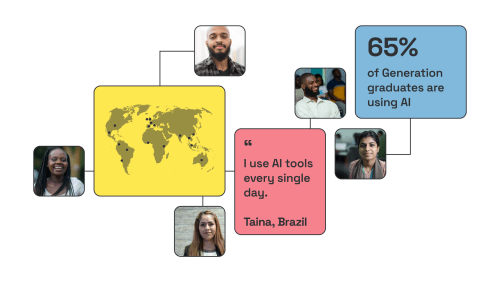AI at Work: A Global Entry-Level Perspective
In the global debate about how AI will affect entry-level roles, the headlines are stark. There is consensus that AI will reshape the workplace, although the how and when are still up for debate. To date, research has tended to focus on professional service workers in high-income countries. However, scant attention has been paid to the AI experience of entry-level workers, particularly those without a college degree, across a range of industries and diverse economies.
We decided to ask this group what they thought. Earlier this year, we surveyed 5,549 of Generation’s alumni who graduated in the past two years (2023 and 2024) to get their perspective on AI in the workplace. These workers, about evenly split between men and women, span 17 countries and are employed in 40 professions spanning healthcare, customer service, tech, green jobs, and skilled trades.
Working in entry-level roles all around the globe, Generation’s alumni have a unique perspective to offer. Approximately 95% of respondents are alumni in lower-middle-income countries (Ghana, India, and Kenya) and upper-middle-income countries (Brazil, Colombia, Mexico, and Thailand), and the remainder are alumni from high-income countries.
This survey presents a view into how they are experiencing AI at work, with an opportunity to hear from the voices that have been missing from the conversation.
The Majority Are Using AI, and They Are Self-Taught Power Users
Among Generation alumni, AI adoption is widespread. The majority of surveyed graduates are using AI – 65% across all groups.
Of the alumni using AI, around half (52%) are using it independently to support their work – they are proactively adopting the technology. The rest are using AI tools that their employer requires of them along with independent usage (17% use both, 31% use only AI tools required by their employer).
A majority are power users, with 79% using it at least once a week and with 37% saying they are using it daily.
The majority of alumni are using AI
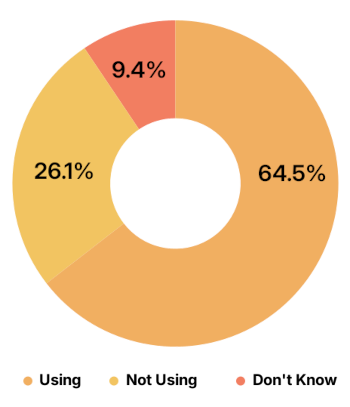
“I use AI tools every single day”
Men Are Heavier Users of AI Than Women
Men are more likely to be using AI than women
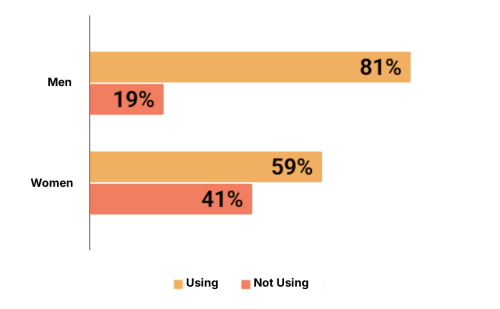
While in every case the majority of respondents are already using AI, we do see some differences in extent of adoption along gender and sector lines.
AI use among men is higher than women, with 81.3% of men saying they use it at work versus 58.8% for women.
This large gap in use is due to a higher representation of women in skilled trades (e.g., sewing machine operator) among our alumni population where AI use is extremely low. That said, more men use AI in every sector.
They use AI in a variety of ways, from content creation to learning and from administrative tasks to coding.
“AI has become my daily work companion; it helps me debug faster, build smarter, and focus on solving real problems rather than repetitive tasks.”
AI Is Supporting Them to Work More Efficiently
Feedback on the impact of using AI tools is overwhelmingly positive across surveyed alumni.
Given the many predicted productivity benefits, it’s not surprising that 94% of AI users say that AI has improved their ability to do their job. But perhaps less expected is the positive impact on how much they enjoy their work: 91% percent say their enjoyment of their job has increased.
The overall feedback of AI having a positive impact on job performance and enjoyment is consistent across sectors and genders.
Alumni say AI has improved their ability to do their job…
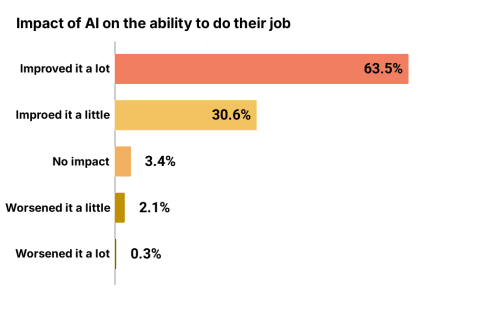
…and increased their overall enjoyment of their job
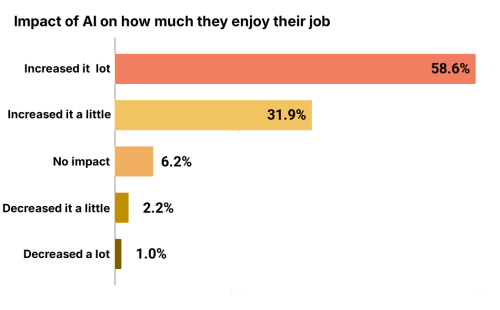
“AI makes my work easier as it grants me more time to work on the more challenging tasks”
Clarity Around Use Cases Would Help Further the Adoption of AI
About a third of alumni (35%) are not yet using AI at work. It’s not due to a lack of appeal: among alumni who are not using AI, 72% indicate interest in using it. However, they name a range of reasons for not doing it today including not having access to training, not knowing how to apply it in their job, not having time to learn it. A small number say they don’t see the benefit or don’t trust it. These answers point to opportunities for employers and workforce programs as they continue to introduce AI to support onboarding to the tools and make the use cases clear.
of those alumni not using AI are interested
of alumni are not yet using AI at work
Acknowledgements
This report was funded by MetLife Foundation. We are grateful to them and to all our funders, who make it possible for Generation to advance its mission.
Note that the views expressed are those of the authors, and funders do not determine research findings, insights, or recommendations.
